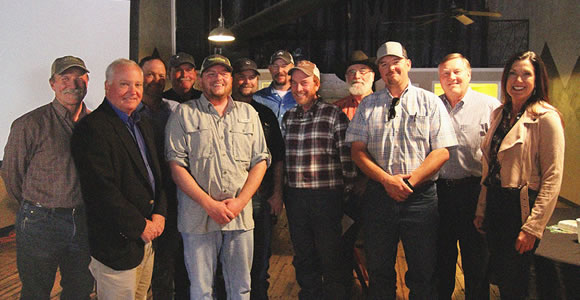State and national officials were present Tuesday when local producers gathered at Bertie Fannie’s in Memphis for the annual meeting of the Panhandle Peanut Growers Association.

Coinciding with National Peanut Month and National Agriculture Week this week, PPGA members learned about current trends in the peanut industry and also received updates on broader agriculture issues.
PPGA President Michael Newhouse of Clarendon urged local producers to be active in their association, stressing the importance of letting policy makers know their stories and the importance of their industry.
Marshall Lamb of the National Peanut Research Laboratory in Dawson, Geo., gave producers an overview of market and production trends.
After low yields and poor quality from the 2016 crop, Lamb said the 2017 crop was the second best yields since 2012 and came from 1.829 million acres, which was the highest since 1991. The result, Lamb said, was the largest peanut crop production in history.
“I researched that all the way back to 1909 and then figured I could quit at that point,” Lamb said.
Lamb said a record drought in Argentina right now is affecting the world market for peanuts, and officials are also keeping an eye on a large surplus supply in the United States resulting from the 2017 crop. He urged producers to be patient for the next three to four weeks to see how Argentina, where harvest is getting underway, will impact supply.
Bob Parker, the CEO of the National Peanut Board, also spoke at Tuesday’s meeting with praise for Panhandle producers.
“This area has a history of sending great leadership to the national board,” Parker said, noting the contributions of the late Donley County producer Bob White and recognizing the new regional and state leadership of Newhouse, Jeff Roper, and others.
Parker focused his remarks mostly on the research and marketing led by the national board, particularly the group’s work on peanut allergies.
New research has shown that peanut allergies can actually be prevented, Parker said, if infants are exposed to peanuts as early as four to six months, a finding which up ends a generation of parenting advice and is a huge discovery.
“When we started this research, a lot of people thought it was a waste,” Parker said of the millions of dollars the industry has invested. “But thank goodness we had people of vision in place. Now we’re the poster child of food allergy research.”
Parker also discussed the development and marketing of new “milked peanut,” which is higher in protein that almond milk and is now available in stores on the eastern seaboard and online nationally through Amazon.
“This is the first new peanut product category to be launched since the development of peanut butter over 100 years ago,” Parker said.
Other speakers Tuesday included Caleb Pool with Congressman Mac Thornberry’s office, who gave a legislative update; insurance agent Kathy Fowler, who spoke on issues of crop insurance and subsidies; and Shelly Nutt, the Executive Director of the Texas Peanut Producers.


Leave a Reply
You must be logged in to post a comment.